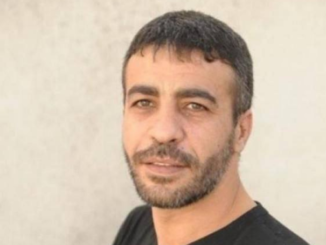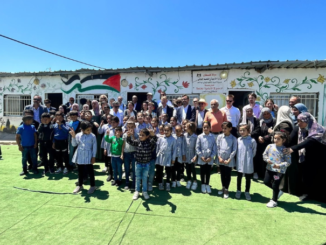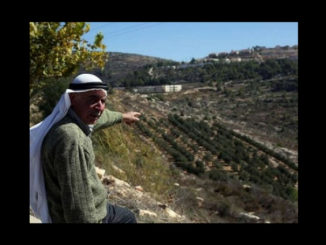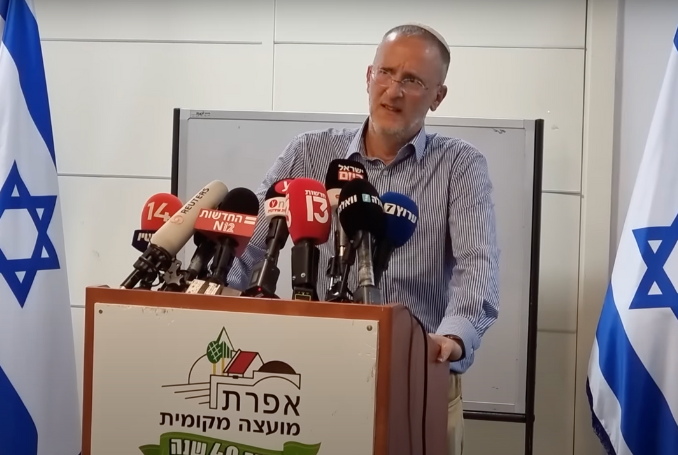
By Jeremy Salt
It is a terrible thing for a child to die before the parent. On April 7 Rabbi Leo Dee lost not one but two of his daughters. They were shot while traveling with their mother from the Jordan Valley to Tiberias.
Driving in front of them in another car, the rabbi only knew something was wrong when there was no response from their mobile phones. The daughters, 15 and 20, died instantly. At their funeral, Rabbi Dee asked ‘How will I tell your mother?’ Two days later, lying seriously wounded in hospital, she died as well. Whatever the circumstances, these were catastrophic blows to a husband and father.
In the funeral orations, the anguished rabbi said the killer was the product of a broken culture “that doesn’t differentiate between good and evil,” whereas he brought up his children to know the difference. “The terrorist, who is he? What did he achieve …. Where’s his future?” he asked.
Rabbi Dee likened wrongdoing to taking cocaine: the killer “took 20 shots, one for each bullet” apparently fired at his wife’s car, “in order to numb his soul”, which is telling him ‘’you are pure evil.’’ Those who justify the killing, on social media, are also numbing their souls with cocaine: “Before long you can justify to yourself that any terrorist is justified to kill any innocent civilian.”
Rabbi Dee is an Englishman who brought his family to live in the West Bank settlement of Efrat in 2014. Efrat is regarded as the ‘capital’ of the Etzion bloc, established in 1927, abandoned in 1948 but re-established after the 1967 war and the occupation of the rest of Palestine.
Built on several hilltops between Al Quds and Al Khalil (Hebron) and connecting up with other settlements, Efrat has a population of about 12,000 settlers. It has no secular schools, with voting patterns indicating strong support for religious and ‘far right’ Jewish supremacist political parties such as Otzma Yehudit (Jewish Power) led by Itamar Ben Gvir and Bezalel Smotrich’s Religious Zionist Party. Both have a long history of anti-Palestinian racism and incitement to violence.
Efrat has been regularly expanded over the years. As it has done ever since 1948, the government has repeatedly taken Palestinian land by defining it as ‘state land’ before handing it over to Jewish settlements. In 2009, 1700 dunums (420 acres) were taken from four Palestinian villages and given to Efrat. Further expansion of Efrat and the Etzion bloc followed in 2011 with 1000 new homes for Efrat, Beitar Ilit, and Gilo ‘authorized’ in March this year.
These developments, as strategically planned, bring settlement closer to Bethlehem and cut the city off from Highway 60, which connects Bethlehem to Hebron and the villages of the southern West Bank. Slowly and deliberately, Bethlehem is being suffocated and Palestinian life on the West Bank further fragmented.
Rabbi Dee asked many questions when paying tribute to his wife and children but there are many questions to be asked of him, beginning with why he brought his wife and children to live on occupied land in the first place.
The world may disagree with the Palestinians that all of Palestine is occupied but it does agree with them on the territory taken in 1967. It is occupied in the view of the UN General Assembly, occupied in the view of the International Commission of Jurists (ICJ), occupied in the view of the International Court of Justice (ICJ), occupied in the view of the EU, and occupied in the view of nearly all world governments. Only the US and its camp followers dissent, preferring the evasive ‘disputed.’
Under the 4th Geneva Convention of 1949, the transfer of a civilian population into territory occupied in war is prohibited and illegal. Did not Rabbi Dee not know this when he took his family to live on the West Bank? Did he not know how dangerous it would be, did he not understand that there is probably no occasion in human history when an occupied people have not taken up such arms as they might have to defend themselves, their families and their land?
Of course, Rabbi Dee would not regard the land as occupied, but rather as land given to the Jewish people by God and now reclaimed by them. In the Zionist view, those non-Jews who were driven off the land or who are still there have no inherent right to be there, against all human rights laws that say they do.
After 75 years “the existing non-Jewish communities in Palestine” – as the 90 percent majority Muslim or Christian population was described by Balfour in his declaration – are still having land taken from them: when they resist with attacks on the soldiers and settlers, they are called terrorists.
Rabbi Dee has the dialectic back to front. The Germans occupying France called the resistance fighters terrorists, just as the British did in East Africa and as the French did in North Africa. The source of terror in all these situations was not resistance to occupation but occupation itself, and while settlers were killed in the north and east Africa, by far the greater number of victims were the occupied peoples themselves.
The same is true of Palestine, far more successful as a colonial-settler venture than Algeria or East Africa, and thus an infinitely worse experience for the people of Palestine. Death and destruction gave the Zionists what they wanted; death and destruction took from the Palestinians what they had, their lives, their homes and their land.
Rabbi Dee’s reflections on good and evil raise other questions. Bad is the opposite of good, not evil, which fundamentally is a religious concept that moves human behavior into the demonic.
On one of the days, Rabbi Dee’s family was being buried, Muhammad Fayez, 15, was killed during an Israeli attack on the Aqabat Jabr refugee camp near Jericho. This boy – the same age as one of Rabbi Dee’s children – was shot in the head, the chest and the abdomen. ‘’What is going to happen to our people?” his aunt asked after his death, to which can be added Rabbi Dee’s question directed to the person who killed his children and wife.
“Where is your future?,” he asked, when the question he needed to ask was ‘’Where is your future in an occupied land?”
What is going to happen to ‘’our people’’ is that while more of them will be killed by the armed enforcers of the occupation, they will continue to resist as they have done ever since Palestine was handed to the Zionists in 1917.
Palestinian culture is not broken, as Rabbi Dee claims but, thanks to the extraordinary resilience of its people, has survived all attempts to destroy it and remains vigorous and defiant.
If Palestinians are still resisting after a century of occupation, first by the British and then the Zionists, it is precisely because they do know the difference between right and wrong, between Rabbi Dee’s “good and evil,” and are fighting for what they know is right. The great bulk of the world’s governments and people, including its moral philosophers and legal experts, agree with them, not Rabbi Dee.
In any case, he should be asking these questions of his own people, not the Palestinians. What will be their future and what is going to happen to them if they continue the heinous acts of which they have been guilty for nearly eight decades? Can it be supposed by anyone except themselves that they will get away with this forever, that there is no point at which it won’t catch up with them?
On the day he was killed Muhammad Fayez was only the latest child to be killed on the West Bank this year. No detail was given in the media of how he was killed or who killed him. He was just killed – end of story, if it even was a story, compared to the mass coverage of the killing of the Dee children.
In 2022, according to the Euro-Med Human Rights monitor team, 204 Palestinians were killed by Israeli soldiers, police, undercover agents or settlers: 142 on the West Bank, 20 in Jerusalem, 37 in Gaza and five in pre-1967 Palestine. A further 18 were killed “inadvertently,” in circumstances not explained by Euro-Med
The dead included 125 civilians not involved in violence, eight women and 41 children: other estimates put the number of children killed at 55. The means of killing included targeted assassination, so-called “summary execution,” air strikes and artillery shelling. The death toll was up 82 percent from 2021 and 491 percent from 2020. Already by early April 2023, a further 94 Palestinians had been killed, many, like Muhammad Fayez, children or not much older.
Innocent and evil, the words used by Rabbi Dee, raise other questions. A person who lives on stolen land, knowing it to be stolen in the eyes of the world, is not innocent but rather an accessory after the fact and benefitting from it in many ways. The argument that ‘we don’t regard it as stolen’ would be dismissed out of hand in a court of law.
As for evil, Rabbi Dee applies the word to the killing of his own children, but would he say the same of the thousands of children the Zionist state of which is an enthusiastic supporter, has killed in Palestine and, over the decades stretching back to 1948, in Lebanon, Syria, Jordan and Egypt, not to speak of their parents, brothers and sisters, aunts, uncles, grandparents and friends?
Would he apply the word ‘evil’ to the pilots who fire missiles into residential buildings in Gaza, knowing they will be killing families, or to soldiers and undercover agents of the state who murder Palestinians in cold blood as they lie wounded on the ground or prevent medical aid reaching them so that they will die? Would he apply the word evil to the government that authorizes such actions?
One can hardly imagine it. His regional council mayor on the West Bank described Rabbi Dee and his family as “true Zionists.” In the view of “true Zionists,” there is no occupation to resist, only a Jewish ‘right’ to the land which the Palestinians refuse to accept.
Accordingly, they are responsible for their own plight: responsible for the planes and tanks Israel sends into Gaza, responsible for the snipers firing at its people from the fence, responsible for the police who break into Al Aqsa and rain blows on the heads of worshippers, responsible for the assassination of Palestinians at home and abroad and even responsible for the killing of their own children. As summed up by the US settler Golda Meir: “We can never forgive the Arabs for making us kill children.”
So, a final question: who is really the product of a culture that “that cannot differentiate between good and evil?”
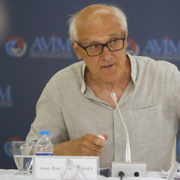
– Jeremy Salt taught at the University of Melbourne, at Bosporus University in Istanbul and Bilkent University in Ankara for many years, specializing in the modern history of the Middle East. Among his recent publications is his 2008 book, The Unmaking of the Middle East. A History of Western Disorder in Arab Lands (University of California Press) and The Last Ottoman Wars. The Human Cost 1877-1923 (University of Utah Press, 2019). He contributed this article to The Palestine Chronicle.



